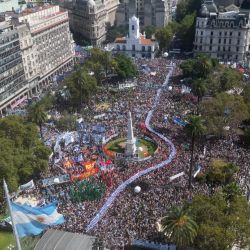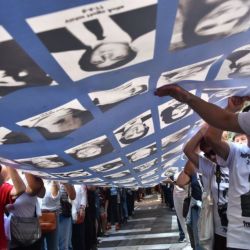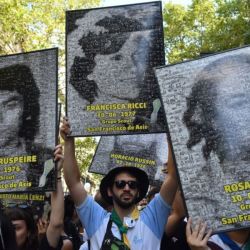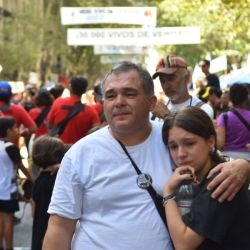Argentines across the country took to the streets on Sunday for the annual march marking the Day of Memory for Truth and Justice, remembering the coup d’etat that brought the brutal 1976-1983 military dictatorship to power.
Marking 48 years since the junta seized power, this year’s demonstrations were the largest in years and had a sharp political influence, with many voicing opposition to the austerity policies of President Javier Milei’s government.
Many of those in attendance said they were marching for the first time. Organisers and media outlets were agreed that it was the largest ‘Memory Day’ turnout in recent years.
In the nation’s capital, Buenos Aires, several streets were cut off as huge crowds flooded downtown to rally in the famous Plaza de Mayo square, where the leaders of human rights groups and NGOs read a document from a stage stationed in front of the Casa Rosada.
Many of those demonstrating were critical of the rhetoric voiced by Milei and his vice-president, Victoria Villarruel, who comes from a military family. Both have attempted to play down the military’s abuses and equalise state terror with left-wing guerrilla violence.
Earlier on Sunday, Villarruel shared a controversial post in commemoration of the Day of Memory, Truth and Justice, in which she declared that "there were not 30,000" people who disappeared during the dictatorship.
Without mentioning the disappearances, torture and assassinations caused by the junta headed by Jorge Rafael Videla, the head of the Senate chose to give a voice to the families of the “victims of the armed organisations” of that time.
"Human rights are for everyone. So is Memory. Truth, Justice and Reparation for the victims of terrorism. Those responsible for these crimes cannot go unpunished. #NoFueron30000," she said on his social networks.
'Complete memory'
The post came shortly before the Milei government released a short video via the Casa Rosada social media account that called for “complete memory, truth and justice.”
Former guerrilla fighter Luis Labraña, former head of the SIDE intelligence service, Juan Bautista ‘Tata’ Yofre, and relatives of the former captain Humberto Viola are featured in the 12-minute video, which prioritises the demands for justice for the “victims of armed groups” and does not note the disappearances, torture and assassinations carried out by the dictatorship and its security forces.
Equating state terrorism with left-wing terrorism during the dictatorship era, the Milei government questions the 30,000 estimate, speaks of a “war” between the two sides, demands compensation for victims of terrorism and harshly criticises the human rights policies of the governments of former presidents Néstor Kirchner and Cristina Fernández de Kirchner.
The video is in line with the message published by Villarruel minutes earlier.
"Human rights are for everyone. So is Memory. Truth, Justice and Reparation for the victims of terrorism. Those responsible for these crimes cannot go unpunished. #NoFueron30000," the video reads in closing.
Argentina’s shift to democracy in 1983 and the years of uninterrupted democratic rule that have followed have been accompanied by a process of memory, truth and justice that has seen human rights violators jailed for crimes against humanity.
Multiple trials featuring the testimony of eye-witnesses and survivors detailed the secret network of detention and torture centres that the dictatorship’s leaders established across the country to persecute and kill its enemies.
Forty-eight years on the coup, 1,173 people have been convicted of crimes against humanity in 316 sentences handed down across the country.
No government since the return of democracy has failed to condemn the state terrorism perpetrated during those dark days on the Day of Memory for Truth and Justice.
Criticism
Speaking onstage on Sunday, Nobel Peace Prize winner Adolfo Pérez Esquivel criticised the government for questioning the 30,000 disappeared estimate voiced by human rights groups.
"We remind this government that it must bear in mind that hatred, repression and revanchism cannot build a more just and fraternal society," said Pérez Esquivel, who was detained and tortured for 14 months during the era of state terror.
One of Argentina’s most iconic human rights leaders, Estela Barnes de Carlotto, accused Milei and Villarruel of resorting to “provocations.”
"The constant provocations by the government of Milei and Villarruel violate all the international pacts that have unconstitutional status," said de Carlotto, the president of the Abuelas de Plaza de Mayo, which searches for the children of the disappeared, who were stolen and legally adopted the military junta.
"Argentine democracy has an enormous debt: to restore the identity of some 300 people, most of whom were born in the clandestine maternity wards of the dictatorship and are now adults between 43 and 49 years old,” she pleaded.
“Let us all help the grandmothers and their legitimate families to find them," he added.
Former president and vice-president Cristina Fernández de Kirchner was among the politicians to mark the anniversary with a post on social media.
In a message that mainly recalled visit to the ex-ESMA Navy Mechanics School two decades ago with her late husband Néstor Kirchner, she wrote that it "would be good if we could all reflect, without dogmatism or hatred, on how we got to where we are today."
Former president Alberto Fernández, Milei's predecessor in office, called on Argentines to remember "a crucial moment in our history."
"At a time when some are trying to distort the truth, it is our responsibility to keep alive the memory and the truth about what happened," he added.
Former Buenos Aires City mayor Horacio Rodrîguez also challenged the Milei administration’s narrative.
“30,000 reasons to redouble our commitment to memory, truth and justice, 30,000 reasons to deepen our work for a stronger, more civic and representative democracy, 30,000 reasons to shout even louder today: Never Again!” he wrote.
– TIMES/PERFIL





























Comments